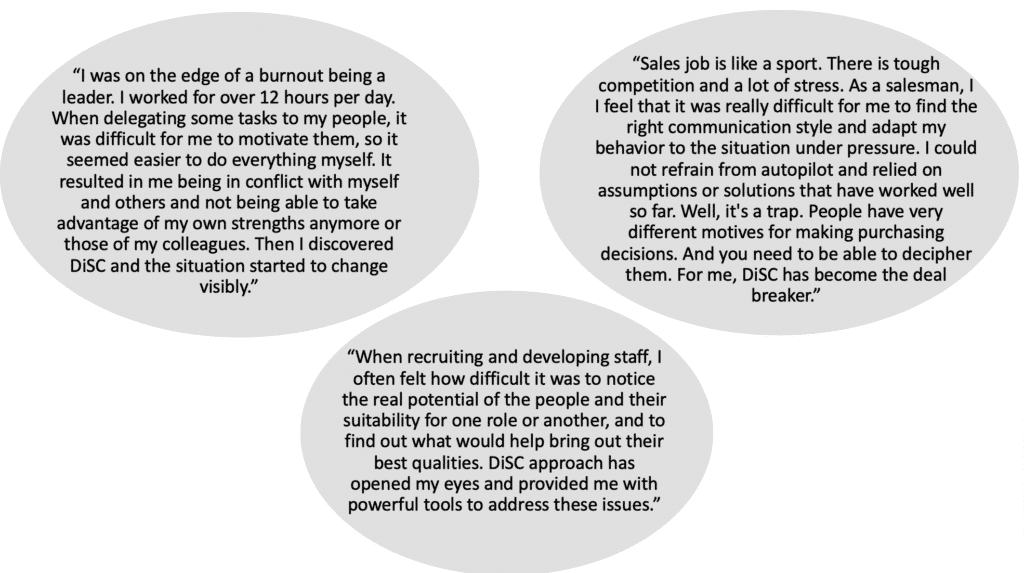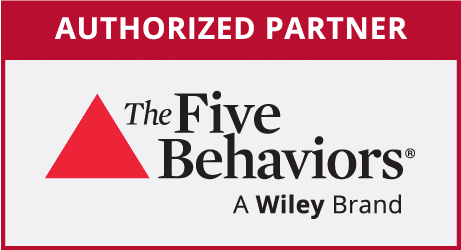
Why use personality tests?
Lots of attempts have been made to find simple logical models that would allow people to be more effective in any collaboration. Effective relationships and behavior mean:
- More adequate understanding of oneself and one’s influence on others
- Being able to consciously increase one’s personal strengths
- Understanding and valuing other people’s differences
- Adapting one’s behavior to better meet the needs of other people and situations
DiSC deals with human behavior – the visible and more easily adaptable part of a person. The DiSC profile as an assessment tool does not deal with assessing personality or abilities but focuses on how a person perceives the world and how it affects his or her behavior and preferences.
The purpose of DiSC is not to label people. In fact, it’s the opposite – to get them out of their box and increase their behavioral amplitude. Thus, it is necessary to know oneself as well as have the ability to “read others” and respond to other people’s priorities in the right way.
DiSC is the most widely used behavioral tool in the world. Over the past 40 years, more than 50 million people have benefited from the DiSC model and training tools. DiSC partners and certified trainers form the largest network of HR experts in the whole world. DiSC partners and certified consultants form the world’s largest network of personnel experts. The most widely used areas of DiSC are teamwork, leadership, coaching, personal development, sales and recruitment.
In order to understand how DiSC methodology can benefit people, it is first necessary to understand the model itself.
It all started 90 years ago with William Moulton Marston’s theory of human behavior. Marston noticed that effective people behave according to the environment, i.e. they can anticipate the expectations or demands of the environment and choose the behavior accordingly. In his opinion, any human behavior could be described through 4 dimensions – dominance, sociality, submission, acceptance. He argued that people are a mixture of all four styles, there is no ‘best’ style – all styles have their strengths and weaknesses and they can all be more or less effective. It is important to be aware of when it is wise to use natural and consciously adapted behaviors.
Today, the terminology of the Marston model has been updated according to the vocabulary and requirements of modern psychology. The abbreviation DiSC is formed from the initials of the English names of these four main natural behavioral dimensions – dominance, influence, steadiness, conscientiousness.

There are many varieties of the DISC assessments on the market, using somewhat different terminology as well as different types of questionnaires and profiles. The most significant success over the last 20 years has been achieved by Everything DiSC® by Wiley (previously Inscape Publishing).
So what is behind the remarkable popularity and practicality of the DiSC methodology?
– Simple but not simplistic. Each profile tells a story that the learner can easily connect with; the learner can act immediately to put the insights and strategies into practice with anyone. We keep this story simple while offering rich content that learners can understand and remember to keep the lessons from DiSC applicable in the long term.
– Reliability. Although the world around us is in constant change, some things always stay the same. One of those is human nature and psychology which has not changed much for millennia. This is also the reason for the DiSC method being timeless. Of course, DiSC tools are constantly being developed, improved and updated, which makes them relevant and easy to implement in today’s world.
– Transformational learning. We often hear that once people experience DiSC profiles, they see the world and others through a new lens. These tools have the power to transform learners’ understanding of themselves and others, offering new choices for how they interact with the people around them. This recognition is a truly eye-opening and powerful experience, but for many, it comes surprisingly late without the right tools.
Some feedback on DiSC:
You might also be interested in







